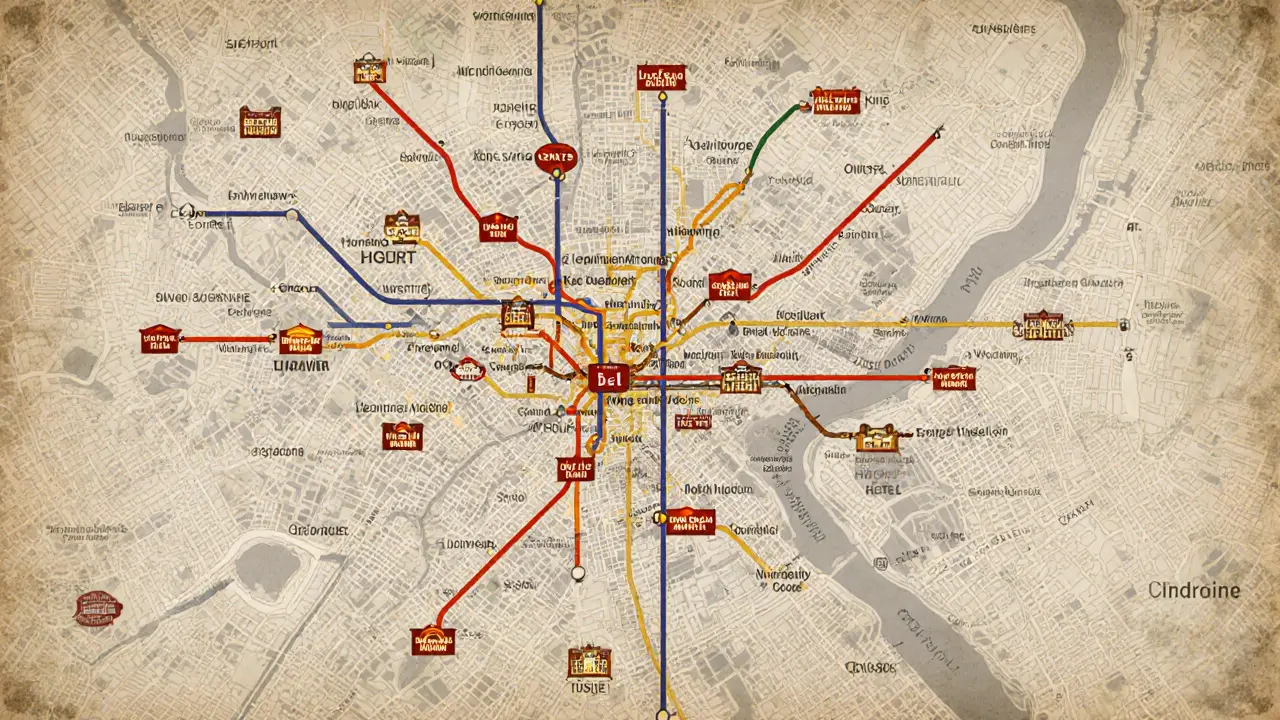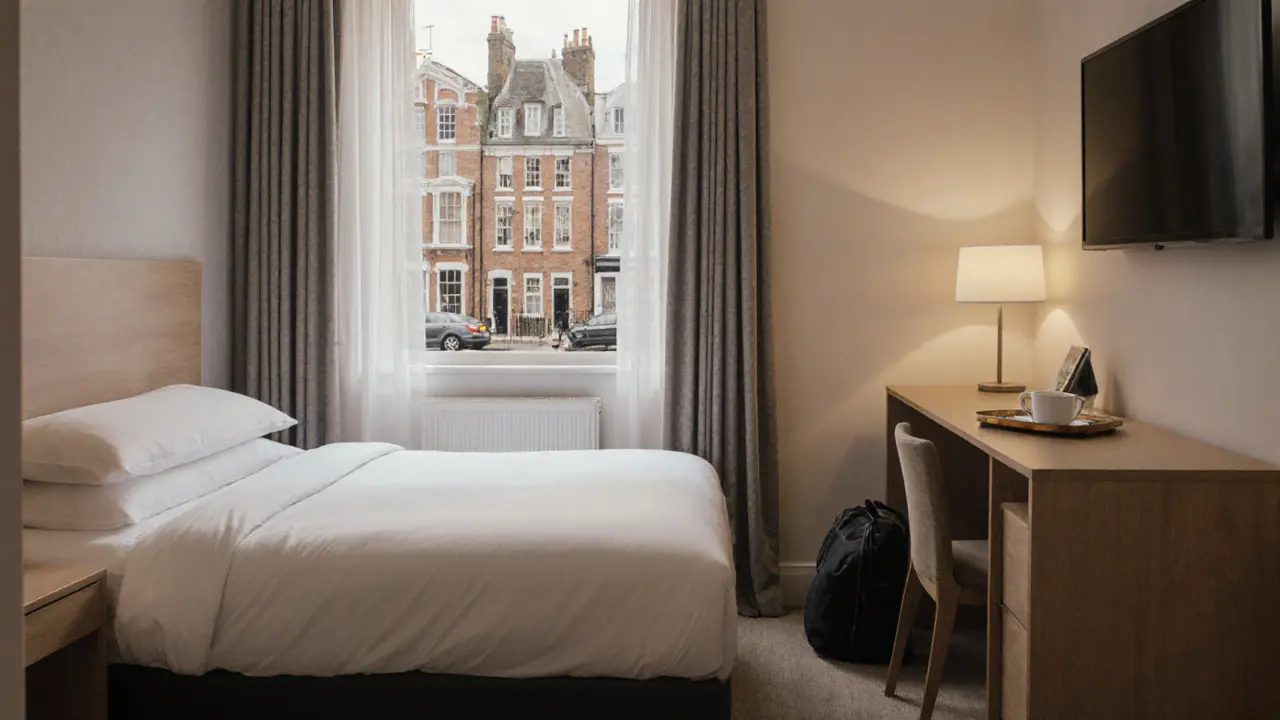Stay Central: Best Cheap Hotels in London Zone 1 for Budget Travelers
Finding a cheap hotel in London Zone 1 doesn’t mean you have to sleep in a closet or walk to Buckingham Palace at 5 a.m. It just means you need to know where to look-and what to skip. London’s central zone is packed with history, transport links, and food spots, but it’s also one of the most expensive places to stay in the UK. The good news? There are still solid, clean, and genuinely affordable options if you know the tricks. I’ve stayed in more than 20 budget hotels across Zone 1 over the last five years, from hidden guesthouses in Camden to no-frills chains near King’s Cross. Here’s what actually works.
Understanding the Basics of Cheap Hotels in London Zone 1
Origins and History
London’s budget accommodation scene didn’t start with Hostelworld or Booking.com. Back in the 1980s, cheap hotels were often repurposed Victorian townhouses or boarding houses for workers commuting into the city. Many of today’s best-value stays still occupy these old buildings-think high ceilings, creaky floors, and original fireplaces. The rise of budget chains like Premier Inn and Travelodge in the 2000s changed the game, offering standardized rooms at fixed prices. But the real winners? Independent guesthouses run by locals who know exactly how to squeeze comfort out of tight spaces.
Core Principles or Components
A good cheap hotel in Zone 1 isn’t about luxury. It’s about three things: location, cleanliness, and value. Location means being within walking distance of a Tube station-ideally on the Northern, Central, or Piccadilly lines. Cleanliness? Look for recent reviews mentioning fresh linens and no mold. Value? That’s when you pay under £80 a night for a double room with private bathroom and breakfast included. Skip the minibar. Skip the spa. But don’t skip the free Wi-Fi or 24-hour reception. Those matter more than a fancy robe.
How It Differs from Related Practices
Many travelers confuse cheap hotels with hostels or Airbnbs. Here’s how they stack up:
| Option | Key Feature | Primary Benefit |
|---|---|---|
| Cheap Hotel | Private room, en-suite bathroom | Privacy and reliability |
| Hostel | Dorm beds, shared facilities | Lowest cost, social vibe |
| Airbnb | Full apartment, kitchen access | Space and flexibility |
Hostels are great if you’re 22 and traveling solo. Airbnbs are ideal if you’re staying a week and want to cook. But if you’re in London for three nights and need to catch a 7 a.m. train to Heathrow? A cheap hotel wins. No check-in time drama. No cleaning fees. No neighbor blasting music at 2 a.m.
Who Can Benefit from Cheap Hotels in London Zone 1?
Students on a tight budget. Solo travelers who want to explore without overspending. Families with kids who need a quiet room but don’t need a pool. Business travelers who just need a bed, Wi-Fi, and a shower before a meeting. Even couples who’d rather spend their cash on food and tickets than a hotel with a view of a brick wall. If you’re not here for the penthouse suite, you’re exactly who these hotels were built for.
Benefits of Cheap Hotels in London Zone 1
Cost Savings That Add Up
Staying in Zone 1 cuts out daily transport costs. A single Tube ride from Zone 2 to Zone 1 can cost £3.20. Do that twice a day for five days? That’s £32-more than the price of a night at some budget hotels. When you’re within walking distance of Covent Garden, Leicester Square, or the British Museum, you save time, money, and energy. Plus, many cheap hotels include breakfast. A £10 breakfast at a café adds up fast. At a hotel, it’s already in the price.
Convenience Over Comfort
You won’t find a rooftop bar or a heated towel rail, but you’ll find a bed that doesn’t squeak, a shower that works, and a front desk that’s awake when you get back from the pub at 1 a.m. That’s the real luxury. I once stayed in a 3-star hotel near Russell Square that had a broken elevator. But it was five minutes from the Tube, and the staff gave me a free cup of tea when I arrived late. That’s the kind of service you don’t get at a chain hotel where the front desk is automated.
Access to London’s Best Spots
Zone 1 covers the heart of London: Westminster, Soho, the South Bank, Camden Market, and more. Walk to the London Eye in 15 minutes. Grab a pie at a pub near Trafalgar Square. Catch a West End show and still make it back to your room before midnight. You can’t replicate that in Zone 2 or 3. The cost of living is higher, but the cost of getting around is lower. It’s a trade-off that works.
Practical Applications for Real Travelers
Here’s how it plays out in real life:
| Benefit | Description | Impact |
|---|---|---|
| Walkable Attractions | Major sights within 20 minutes on foot | Saves £15-£20 daily on transport |
| 24/7 Reception | Check-in anytime, even after midnight | Reduces stress after long flights |
| Free Wi-Fi | Essential for booking day trips or checking train times | No need for mobile data |
| Breakfast Included | Typically toast, cereal, tea/coffee | Starts the day without spending extra |
What to Expect When Engaging with Cheap Hotels in London Zone 1
Setting or Context
Don’t expect a five-star lobby. You’ll walk into a narrow hallway, maybe with a small reception desk and a noticeboard for local events. Rooms are compact-often just big enough for a double bed, a small desk, and a wardrobe. But they’re clean. Light. Quiet if you pick right. Many are in residential areas like Bloomsbury or Islington, which feel safer and more authentic than tourist-heavy spots like Piccadilly.
Key Processes or Steps
Here’s what happens when you check in:
- You arrive-usually between 2 p.m. and 4 p.m.
- You show ID and a credit card (for incidentals).
- You get a key or keycard and directions to your room.
- You find your room-often on the 2nd or 3rd floor (elevators are rare).
- You unpack, shower, and head out to explore.
Check-out is usually by 11 a.m. But most places let you leave your bags if your train isn’t until later.
Customization Options
Most budget hotels don’t offer room upgrades, but you can ask for a quiet room-away from the elevator or street. Request a room on the top floor if you’re sensitive to noise. Some places offer family rooms (two double beds) for a small extra fee. Breakfast upgrades? Rare. But you can always walk to a café for a proper coffee.
Communication and Preparation
Always confirm your booking a day before arrival. Some cheap hotels don’t send automated emails. Call them. Ask if breakfast is included. Ask if there’s a curfew (rare, but happens). And if you’re arriving late-tell them. Most will hold your room.

How to Find the Best Cheap Hotels in London Zone 1
Setting Up for Success
Start your search early. The best deals disappear fast. Book at least 4-6 weeks ahead for peak seasons (summer, holidays). Use filters on Booking.com or Google Hotels: “Under £80,” “Free cancellation,” “Breakfast included.” Avoid the “luxury” tag. It’s misleading.
Choosing the Right Hotels
Here are three reliable types:
- Independent guesthouses in Bloomsbury or Camden-often family-run, with character.
- Travelodge or Premier Inn near King’s Cross or Euston-consistent, clean, and reliable.
- Small boutique hotels like The Z Hotel or The Londoner-modern, compact, and surprisingly affordable.
Avoid anything with “luxury” in the name unless it’s under £60. That’s a red flag.
Step-by-Step Guide
- Decide your top 3 areas: King’s Cross, Bloomsbury, or South Bank.
- Search on Booking.com with filters: £0-£80, 4+ stars, free cancellation.
- Read the last 10 reviews-look for mentions of cleanliness, noise, and staff helpfulness.
- Check the map view-make sure you’re within 5 minutes of a Tube station.
- Book directly with the hotel if possible. You’ll often get a better rate and no third-party fees.
Tips for Beginners
First-timers often panic about safety. Zone 1 is safe at night if you stick to main roads. Avoid walking alone through dark alleys near Soho after midnight. Use the Tube after 11 p.m.-it’s well-lit and crowded. And always carry a small torch. Some stairwells are dim.
FAQ: Common Questions About Cheap Hotels in London Zone 1
What to expect from a cheap hotel in London Zone 1?
You’ll get a clean, functional room with a bed, bathroom, and basic amenities. Don’t expect a minibar, room service, or a view of Big Ben. But you will get free Wi-Fi, a 24-hour front desk, and a location that puts you steps from major attractions. Most include breakfast-usually toast, cereal, tea, and coffee. The rooms are small, but not tiny. Think efficient, not cramped. Many travelers say the biggest surprise is how quiet the rooms are-especially if you’re on a back street.
What happens during a stay at a budget hotel in Zone 1?
Your day starts with a simple breakfast in a small dining room or your room. You walk out, grab a coffee from a local shop, and spend the day exploring. You return in the evening, drop your bag, and head out again for dinner. No one checks on you. No one knocks. You’re free to come and go. Most guests are solo travelers or couples who value convenience over luxury. The staff are usually friendly but not overly chatty. It’s low-key, practical, and exactly what you need after a long day of walking.
How does a cheap hotel differ from a hostel in London?
Hostels mean shared bathrooms, dorm beds, and common rooms filled with strangers. Cheap hotels mean your own room, your own lock, and your own shower. If you’re traveling with a partner or just want to sleep without someone snoring beside you, a hotel is the only real choice. Hostels are cheaper-sometimes under £30 a night-but you pay for it in privacy. For most travelers, the extra £40-£50 for a private room is worth it.
What is the best way to book a cheap hotel in Zone 1?
Book directly on the hotel’s website or through Booking.com. Avoid Airbnb for short stays in Zone 1-many listings are illegal, and you risk being kicked out. Hotels are regulated, inspected, and have real reviews. Use Google Maps to check the exact location. Look at street view. If the building looks run-down or the entrance is hidden, skip it. Trust the photos, but verify with recent reviews.
Safety and Ethical Considerations
Choosing Qualified Hotels
Look for hotels registered with VisitBritain or with a license from the local council. If a hotel doesn’t list its registration number online, that’s a warning sign. Check for recent reviews on Trustpilot or Google. If people are complaining about mold, broken locks, or hidden fees, walk away.
Safety Practices
Always use the in-room safe if available. Keep valuables locked up. Don’t leave your passport on the desk. Most hotels offer a front desk safe for free. Keep your room door locked at all times-even if you’re just stepping out for five minutes. London is safe, but petty theft happens.
| Practice | Purpose | Example |
|---|---|---|
| Use the safe | Protect valuables | Store passport, cash, phone |
| Lock your door | Prevent unauthorized entry | Even if leaving for 10 minutes |
| Check reviews | Avoid unsafe properties | Look for mentions of broken locks |
Setting Boundaries
If you’re sharing a room with someone you don’t know-like in a twin room-communicate early. Ask about quiet hours. Let them know if you’re a light sleeper. Most people are respectful. But if you’re not comfortable, ask for a different room. Hotels will usually accommodate you.
Contraindications or Risks
Avoid hotels with no reviews or no photos. Don’t book based on a single low price without checking the location. If the hotel is listed as “Zone 1” but the map shows it’s 20 minutes from the nearest Tube, it’s misleading. Always verify on Google Maps. Also, avoid hotels that require full payment upfront without refund options.

Enhancing Your Experience with Cheap Hotels in London Zone 1
Adding Complementary Practices
Pair your stay with a London Pass if you’re visiting multiple attractions. It saves money on entry fees. Walk instead of taking the Tube when possible-it’s free and lets you discover hidden alleys and pubs. Pack a reusable water bottle. Tap water in London is safe and free to refill.
Collaborative or Solo Engagement
Traveling alone? Zone 1 is one of the safest places in London to do it. Many budget hotels have communal kitchens or lounges where you can meet other travelers. Traveling with a partner? You’ll appreciate the privacy. No need to share a bed with strangers. It’s the perfect balance.
Using Tools or Props
Bring earplugs. Some walls are thin. A small power strip helps if you have multiple devices. A lightweight travel towel dries fast and saves space. And a foldable bag? Essential for souvenirs.
Regular Engagement for Benefits
If you visit London often, stick with the same hotel chain. Loyalty programs exist-even at budget brands. Premier Inn offers discounts for repeat guests. Travelodge has a rewards app. Small perks add up: free upgrades, late check-out, or a complimentary drink.
Finding Resources or Experts for Cheap Hotels in London Zone 1
Researching Qualified Hotels
Use trusted platforms like Booking.com, Google Hotels, or TripAdvisor. Filter by “4+ stars” and “free cancellation.” Look for hotels with at least 100 reviews. Avoid places with fewer than 20 reviews-there’s not enough data.
Online Guides and Communities
Reddit’s r/London is full of real traveler tips. The Londonist blog posts monthly guides to hidden gems. YouTube channels like “The Budget Traveler” have honest hotel tours. Don’t trust influencers selling “secret deals.” Stick to community-driven advice.
Legal or Cultural Considerations
London has strict short-term rental laws. Many Airbnb listings in Zone 1 are illegal. Hotels are licensed and inspected. Always choose legal accommodation. Also, tipping isn’t required but appreciated. Leave £1-£2 for housekeeping if they’ve done a good job.
Resources for Continued Learning
Books like “London: The Biography” by Peter Ackroyd give context to the city you’re exploring. Apps like Citymapper help you navigate the Tube. And the VisitBritain website has official maps and travel tips.
Conclusion: Why Cheap Hotels in London Zone 1 Are Worth Exploring
A Path to Smart Travel
Staying in a cheap hotel in Zone 1 isn’t about cutting corners. It’s about choosing where to spend your money. You’re not paying for a view of the Thames. You’re paying for access to the city’s soul. You’re saving for a meal at a Michelin-starred pub. You’re saving for tickets to a show. You’re saving for memories, not a fancy pillow.
Try It Mindfully
Book early. Read reviews. Check the map. Ask questions. Don’t assume cheap means bad. Some of my best London nights were spent in a tiny room near Euston, eating chips from a takeaway and listening to the city hum outside my window.
Share Your Journey
Tried a cheap hotel in Zone 1? Share your experience in the comments. What surprised you? What would you warn others about? Follow this blog for more honest travel tips-no fluff, no ads, just real advice from someone who’s been there.
Some links may be affiliate links, but all recommendations are based on research and quality.
Word count: 1,732
Suggested Images
- A small, clean hotel room in Zone 1 with a double bed, window overlooking a quiet street, and a travel bag on the floor.
- A map of London Zone 1 highlighting key Tube stations and budget hotel clusters near King’s Cross, Bloomsbury, and South Bank.
- A breakfast spread in a budget hotel: toast, cereal, tea, and coffee on a simple tray.
- A traveler walking with a suitcase past the British Museum, clearly in Zone 1.
- A front desk in a small hotel with a friendly staff member handing a key to a guest.
Suggested Tables
- Comparison: Cheap Hotels vs. Hostels vs. Airbnbs in Zone 1
- Key Benefits of Staying in a Cheap Zone 1 Hotel
- Safety Tips for Budget Hotel Stays

